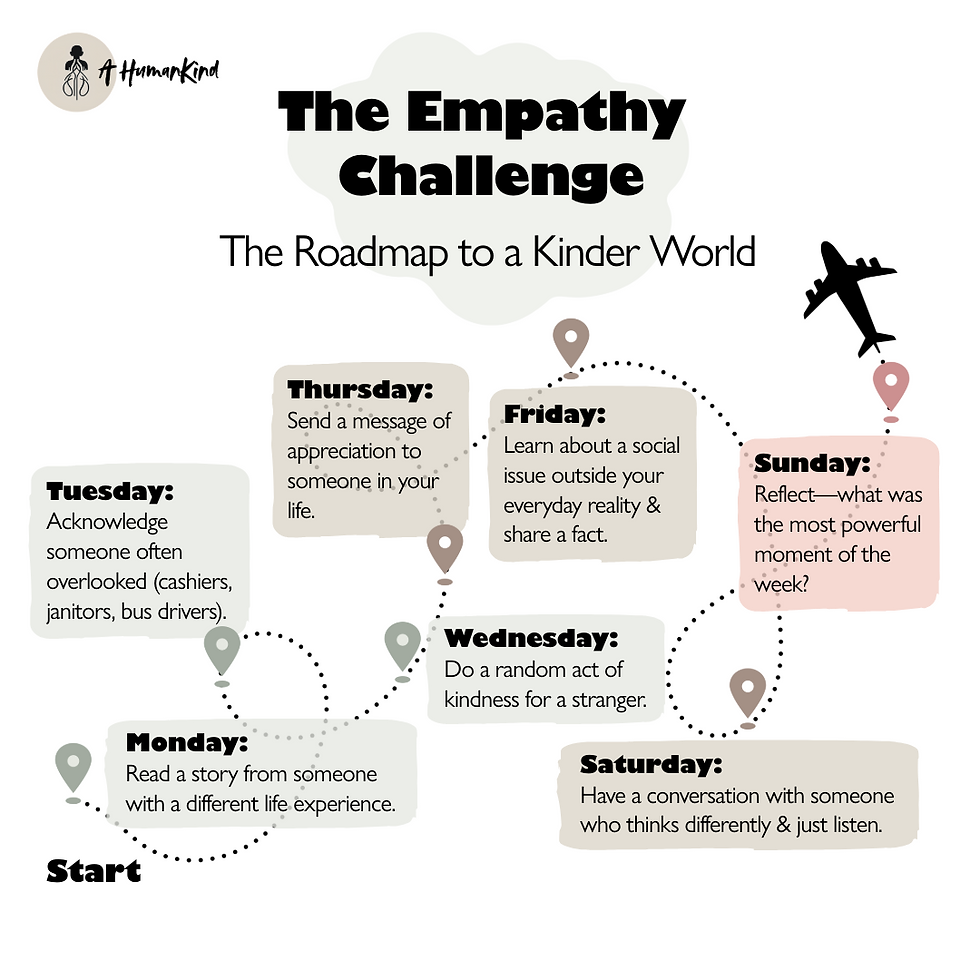Unlocking Empathy: The Skill That Can Change Your Life
- A HumanKind

- Mar 11
- 4 min read
Empathy isn’t just about feeling for others—it’s about having the courage to understand, the wisdom to listen, and the strength to take action.
Empathy. We hear this word all the time. “Be more empathetic!” “You should have some empathy!” But let’s be real—what does that actually mean? Are we supposed to feel what others feel? Read minds? Cry at every sad movie we see? (If that were the case, we’d all be a mess after watching Up... But… we were, right?)
This week, we’re diving into what empathy really is, why it’s actually a superpower, and how you can train your brain to be more empathetic—without emotionally exhausting yourself. Because here’s the thing: Empathy isn’t just something you have or don’t have. It’s a skill. And like any skill, it can be learned, improved, and used to make life better—not just for others, but for you too.
What Is Empathy, Really?
Empathy is the ability to step outside of your own experience and understand someone else’s perspective, emotions, or struggles. It’s not about agreeing with them or absorbing their pain like an emotional sponge—it’s about recognizing their reality and acknowledging it without judgment.
There are actually three types of empathy, as defined by psychologists:
Cognitive Empathy – This is the logical side of empathy. It’s when you can understand someone’s emotions intellectually, even if you don’t necessarily feel them yourself. (Example: A doctor understanding a patient’s fear without becoming emotionally overwhelmed.)
Emotional Empathy – This is when you literally feel what someone else is feeling. If you’ve ever teared up because your friend was crying, that’s emotional empathy in action. (Example: Feeling a knot in your stomach when a loved one gets bad news.)
Compassionate Empathy – This is the ultimate goal. It’s when you not only understand and feel for someone but take action to help them. (Example: Seeing a homeless person in the cold, feeling their struggle, and buying them a warm meal.)
Research from neuroscientists at Princeton University suggests that our brains are wired for empathy, thanks to mirror neurons. These neurons activate when we see someone in pain or joy, allowing us to experience a fraction of what they’re feeling. Ever winced when you saw someone stub their toe? That’s your mirror neurons at work. (Learn more about mirror neurons here).
Is Empathy a Strength or a Weakness?
Society has a complicated relationship with empathy. On one hand, we admire compassionate leaders like Nelson Mandela or Malala Yousafzai. But on the other hand, we sometimes treat emotional sensitivity as a liability. “You’re too soft.” “Don’t take things so personally.”
Here’s the truth: Empathy is not weakness. It’s power.
It builds trust and connection – Studies show that leaders who show empathy are rated as more effective by their teams (Harvard Business Review, 2021).
It makes you a better problem-solver – Understanding different perspectives helps you navigate conflicts and find creative solutions.
It reduces prejudice and bias – Research from Yale University found that exposure to diverse personal stories helps reduce stereotypes and increase understanding (Yale Study).
It makes us happier – A study from the University of Michigan found that practicing empathy activates brain regions associated with reward and pleasure. Being kind genuinely feels good.
That said, empathy also requires balance. Too much emotional empathy can lead to burnout, also known as compassion fatigue. It’s important to practice boundaries and recognize when to step back to protect your own well-being.
Can You Train Yourself to Be More Empathetic?
Short answer? Yes. Long answer? It takes practice, curiosity, and a willingness to unlearn biases. Here’s how you can level up your empathy game:
Listen Without Thinking About Your Response – Most people listen just to reply. Next time, try listening to understand instead. Let there be silence. Absorb their words. Then respond thoughtfully.
Challenge Your Assumptions – Before judging someone’s actions, ask: What might they be going through that I don’t see? (The grumpy cashier might be exhausted from working two jobs, not "just rude.")
Expose Yourself to Different Perspectives – Read books, watch documentaries, or follow accounts from people with different backgrounds. Research from Stanford found that storytelling increases empathy by 30% (Stanford Research).
Practice Small Acts of Empathy Daily – Give a genuine compliment, acknowledge someone’s hard work, or check in on a friend. Tiny moments matter.
Want to actively improve your empathy? Check out the Empathy Challenge on Instagram: @ahumankindcollective.

Why Empathy Matters More Than Ever
Let’s be honest—right now, the world feels like a giant screaming match. Everyone has an opinion, but not everyone is listening.
Empathy is how we bridge those gaps. It doesn’t mean we have to agree with everyone, but it does mean we recognize their humanity. It means we stop dehumanizing people just because they think differently or come from another place.
At the end of the day, empathy isn’t about being perfect—it’s about being present. And that’s something we all have the power to do.
Join the Conversation
This week, we’re exploring empathy—how to practice it, why it’s needed, and what happens when we lose it.
What does empathy mean to you? Have you ever had a moment where someone’s empathy changed your perspective? Let’s talk about it.



Comentarios